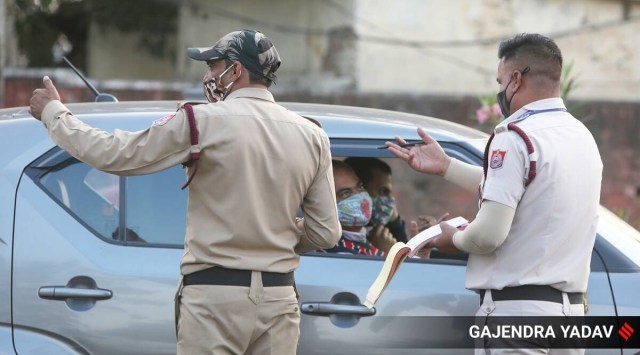With automated traffic violation monitoring system Bengaluru police hope to shed ‘fine mongering’ image
The new system which has been in action for the last few weeks intends to impose fines for traffic violations only through automated systems.
 Over the last few years, the Bengaluru traffic police have earned the bad reputation of being fine-happy and harassing vehicle owners using the excuse of traffic violations. (File)
Over the last few years, the Bengaluru traffic police have earned the bad reputation of being fine-happy and harassing vehicle owners using the excuse of traffic violations. (File) In an effort to bolster its public image, the Bengaluru traffic police — which is often viewed as a harasser, at times even in the absence of any visible traffic violations — is attempting to adopt a completely contactless and automated system of dealing with traffic violations.
The new system which has been in action for the last few weeks intends to impose fines for traffic violations only through automated systems. The systems include images of violations captured by CCTV cameras and pictures captured by traffic policemen on the ground. In fact, officials said, only these two methods will be used to record violations.
“There will be no direct payments to policemen on the ground. Going ahead, all payments will only be received through automated systems,” a senior traffic police officer said.
Among the measures that the Bengaluru police are attempting to implement to ensure that traffic violators do not escape penalties for violations is by bringing in laws that mandate a no objection certificate from the traffic police for annual insurance renewals for vehicles. “This is being tried in some states like Telangana and we would like to implement it in Karnataka,” an officer said.
“We want to bring in more transparency. There are complaints from motorists that the police harass them which is why we are implementing contact less enforcement. There will be no contact between a policeman and the road users,” Bengaluru traffic police commissioner M A Saleem said recently.
“We have installed a lot of automatic number plate recognition cameras, red light violation cameras and regular surveillance cameras that will be used to book cases against violators of traffic rules,” he said.
In July last year, the state director-general of people Praveen Sood had stated on social media that he had ordered that “no vehicle shall be stopped merely for checking documents unless it has committed a traffic violation visible to the naked eye. Only exception is drunken driving”.
The police have introduced an Intelligent Traffic Management System in the city where Artificial Intelligence systems will detect traffic violations and issue challans through SMSs to mobile phones.
ITMS has been implemented at 50 important traffic junctions in Bengaluru and cameras will book cases of violations of speed limit, red light, stop lane, helmetless riding, triple riding, drivers using mobile phones and driving without seat belts. The ITMS is an Al-enabled solution with 250 Automatic Number Plate Recognition (ANPR) cameras and 80 Red Light Violation Detection (RLVD) cameras installed at 50 junctions to detect violations. These cameras automatically detect violations and generate challans.
“This system saves a lot of traffic manpower which can be redeployed for traffic management and traffic regulation and provide a better traffic service to the public,” Saleem said.
“Make no mistake, the objective is not to collect fines. It is contactless, AI enabled and 24×7. The aim is to enhance better road behaviour and compliance,” Bengaluru police commissioner Prathap Reddy said on social media recently about the intelligent traffic management system.
The Bengaluru Traffic Police social media handle states that the “police are on the threshold of a major technological breakthrough to manage the congestion and chaos on the roads in an efficient manner”.
“It is very annoying for commuters to be hauled up by a policeman for fines while they are traveling on the streets when there is no visible violation. When people are stuck in traffic jams they have to also view the spectacle of policemen collecting cash fines at traffic junctions and main roads. This has contributed to a negative view of the police over the years. We want to change it,” a police officer said.
The number of traffic offences registered by policemen on the ground is around 40,000 in a year. With the automated system, as many as 50,000 cases can be registered each year, say the police.
“The police get only Rs 170 to Rs 180 crore every year from traffic fines. This amount can be collected through an efficient automated system as well,” a senior police officer said. In Bengaluru, there is nearly Rs 500 crore of traffic penalties that are overdue and the state transport department issued an order on February 2 offering a 50 per cent discount on fines for violations flagged up to February 11.
The Bengaluru police have collaborated with the payment gateway firm Paytm to collect traffic fines through the online method in the recent months. “The new methods will impact the system where the pretext of traffic violations was used by the policemen to collect bribes that was shared at multiple levels. The new methods will not stop corruption but can reduce it and improve the image of the police,” sources said.
Over the last few years, the Bengaluru traffic police have earned the reputation of being fine-happy and harassing vehicle owners using the excuse of traffic violations. In some police stations, especially in the tech corridors of the city, the police allegedly put down bribe rates of Rs 20,000 to Rs 30,000 for the release of vehicles seized for traffic violations. The police have been accused of randomly targeting vehicles under the pretext of traffic violations to harass vehicle owners.
“We hope the contactless policing of traffic and use of policemen for traffic management will provide the police image in Bengaluru a facelift,” a police officer said.












